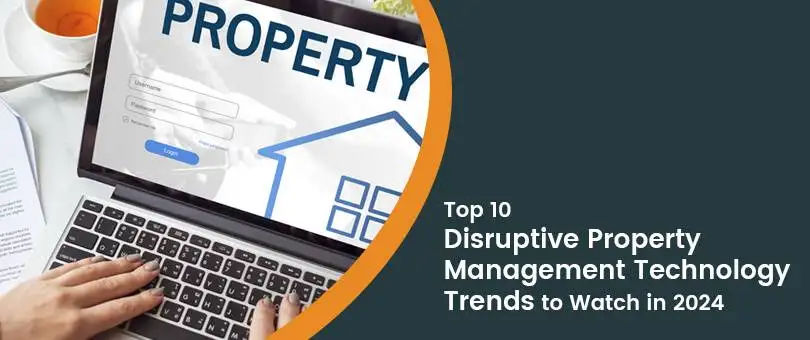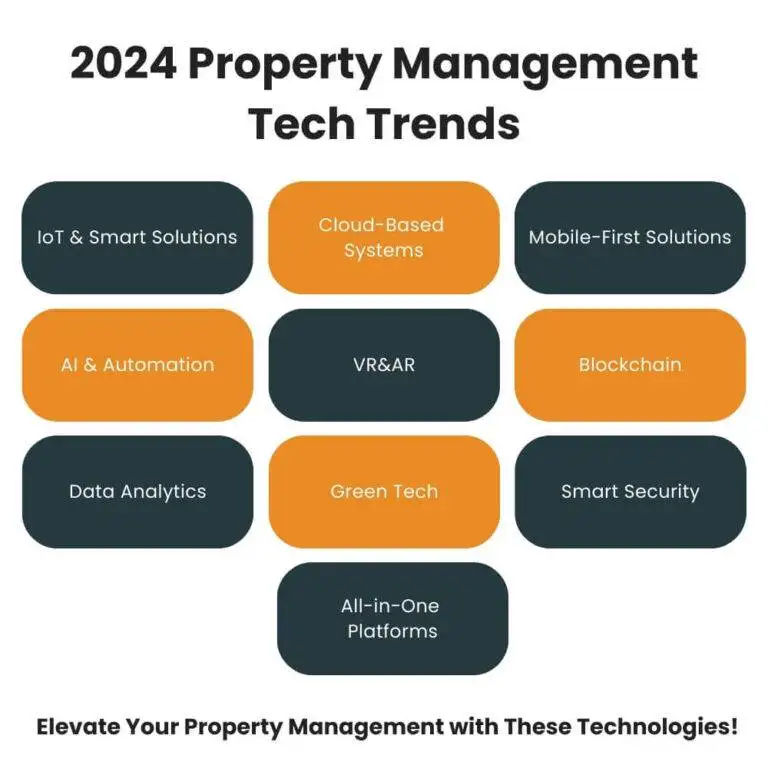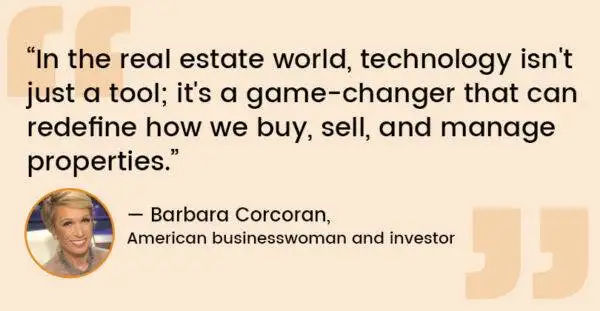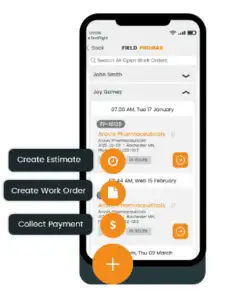Top 10 Disruptive Property Management Technology Trends to Watch Out for in 2025

The global property management market is set to hit a whopping $23.63 billion by 2026. That’s like adding a whole new Manhattan to the industry every year! This explosive growth isn’t just about more buildings – it’s powered by some seriously cool tech that’s turning the property management world on its head.
As we roll into 2024, keeping up with these trends isn’t just for the tech geeks anymore. Whether you’re juggling a few apartments or running a real estate empire, these new gadgets and gizmos could be your secret weapon. They’re like having a super-powered toolbelt for your property management business needs!
Ready to dive in? Let’s explore the top 10 property management technology or Proptech trends that are making waves in 2024. We’ll break down what they mean for everyone in the game – from the big bosses to the folks on the ground. Buckle up, it’s going to be a fun ride!

1. IoT and Smart Property Solutions: Buildings with Brains!
Remember when “smart” just meant your phone? Well, now your whole building can join the genius club! The Internet of Things (IoT) is like giving your properties a PhD in efficiency. Here’s what’s cooking:
- Smart Sensors: These smart sensors from brands like NoiseAware, Minut, and others do more than just track temperature and humidity — they monitor noise levels and more to provide comprehensive protection. In fact, some NoiseAware competitors offer even more advanced features, helping you proactively address potential issues before they escalate. They’re like having a 24/7 building doctor, catching problems before they turn into headaches.
- Predictive Maintenance: Imagine if your building could tell you, “Hey, my boiler’s feeling a bit under the weather.” That’s IoT in action! It spots potential issues before they become major headaches.
- Energy Management: Smart thermostats and lighting systems that know when to chill out (literally). It’s like having a super-efficient roommate who always remembers to turn off the lights. With IoT, property managers aren’t just managing buildings – they’re running a team of super-smart, happy-tenant-producing machines!
2. Cloud-Based Property Management Systems: Your Office in the Sky
Remember lugging around bulky files or being chained to your desk? Those days are as outdated as flip phones! Cloud-based property management systems are like having your entire office float around with you. Pretty nifty, right? Here’s why they’re the cool kids on the block:
- Data at Your Fingertips: All your property info, chillin’ in the cloud. Access it from your couch, a beach, or while waiting for your latte. Work-life balance just got a whole lot easier!
- Grows Like a Beanstalk: Adding more properties to your portfolio? No sweat! These systems grow with you, no expensive upgrades needed. It’s like magic, but with less top hats and rabbits.
- Plays Well with Others: These systems are the social butterflies of the software world. They get along great with other tools like QuickBooks, making your job smoother than a freshly waxed floor.
In 2025, if you’re not on the cloud, you’re missing out on some serious property management party in the sky!
3. Mobile-First Solutions for Field Technicians: Superpowers in Their Pockets
Your maintenance folks are the real-life superheroes of property management. Now, we’re giving them gadgets that would make even Tony Stark jealous! Mobile-first solutions are like utility belts for your on-the-go team. Check it out:
-
Instant Communication: No more phone tag or pigeon mail. Real-time chat keeps everyone in the loop faster than you can say “leaky faucet.”
-
Task Scheduling on the Fly: To-do lists that pop up on phones like magic. Swipe, tap, and voila! Tasks managed with the flick of a finger. It’s like magic, but with less top hats and rabbits.
-Info Overload (in a good way): Need details about a property? It’s all there, right in their pocket. It’s like having the entire building’s history on speed dial.
These mobile tools are turning your maintenance team into property management ninjas. Hyah!
4. AI and Automation: Your New Robot Sidekicks
Artificial Intelligence isn’t just for sci-fi movies anymore. It’s here, it’s smart, and it’s ready to be your AI girlfriend and new best friend in property management:
- Automagic Workflows: AI can handle the boring stuff like screening tenants or scheduling repairs. It’s like having a super-efficient assistant who never needs coffee breaks.
- ChatBots: These digital chatterboxes can answer tenant questions 24/7. It’s like having a super-friendly, never-sleep receptionist and costs 90% less than a live operator.
- Data Wizardry: AI crunches numbers faster than you can say “property management technology trends” (try saying that five times fast!). It turns mountains of data into goldmines of insights.
In 2024, AI is your tireless sidekick, ready to tackle tasks while you focus on the big picture. High five, robot!

5. VR and AR: Welcome to the Matrix (Property Management Edition)
Virtual and Augmented Reality aren’t just for gamers anymore. They’re giving property management a sci-fi makeover:
- Virtual House Tours: Show off properties and interior designs without leaving your chair. It’s like teleporting your tenants into their future homes!
- X-ray Vision for Techs: Okay, not really x-ray, but AR can help technicians see hidden pipes and wires. No more playing “guess where the problem is”!
- Training in a Virtual World: Teach your team new skills in a risk-free digital environment. All the learning, none of the “oops, I broke the real thing” moments.
VR and AR are turning property management into an immersive, futuristic experience. Ready player one?

6. Blockchain: Not Just for Crypto Enthusiasts
Blockchain isn’t just about digital coins anymore. It’s making waves in property management, and no, you don’t need to be a tech wizard to appreciate it:
-
Fort Knox-level Security: Keep all your transactions locked up tighter than a drum. It’s like having a digital bodyguard for your data.
-
Smart Contracts: Agreements that enforce themselves. It’s like having a tiny, incorruptible lawyer living in your computer. To ensure these contracts function flawlessly, smart contract auditing is crucial, providing an extra layer of security by verifying and correcting any vulnerabilities before they are executed.
-
Crystal-Clear Records: Every transaction is recorded forever, providing transparency that’s valuable not just for property management but also for tracking crypto tax obligations.
Blockchain development might sound like techno-mumbo-jumbo, but with the help of the best crypto app, it’s making property management safer and smoother than ever.
7. Data Analytics: Turning Numbers into Property Management Superpowers
In 2024, data isn’t just numbers – it’s your secret weapon. Here’s how property management is striking gold with data:
-
Crystal Ball Predictions: Use past data to peek into the future. It’s like having a fortune teller for your properties.
-
Efficiency Detective: Find out where time or money is doing a disappearing act. Then, make it reappear like magic!
-
Happy Tenant Recipe: Discover the secret sauce that keeps your tenants smiling. More happy tenants, less turnover headaches!
8. Green Tech: Saving the Planet (and Your Wallet)
Going green isn’t just good karma – it’s good business! Check out these eco-friendly trends that are making waves:
-
Energy-Saving Appliances: Use less power, save more green. Your wallet (and Mother Nature) will thank you!
-
Solar Power: Harness the power of that big ball of fire in the sky. It’s like having an unlimited energy coupon from the sun!
-
Water-Saving Wonders: From smart sprinklers to low-flow toilets, saving water is the new cool. Every drop counts!

9. Smart Security: Fort Knox 2.0
Keeping properties safe is getting a high-tech makeover. It’s like giving your buildings their own superhero suit:
- Genius Locks: Control access with your phone.
- Eagle-Eye Cameras: Spot trouble before it happens with smart surveillance. No more “who dunnit?” mysteries.
- VIP Access Control: Know exactly who’s coming and going. It’s like having a guest list for your whole building!
With these smart security trends, your properties will be safer than Fort Knox!
10. All-in-One Platforms: Your Property Management Command Center
Imagine having all your tools in one place. That’s what integrated platforms are all about:
-
One Dashboard to Rule Them All: Manage everything from a single screen. No more digital juggling!
-
Real-Time Intel: Get up-to-the-minute info on all your properties. It’s like having a property psychic on the speed dial!
-
Automation Station: These platforms can handle tons of tasks automatically. More time for you to be the property management rockstar you are!
Speaking of awesome platforms, let’s talk about Field Promax. It’s like the ultimate multitool for property management. From scheduling to mobile access, it’s got everything you need in one place.

Conclusion
And there you have it, folks! These are the top 10 property management technology trends that are turning the industry upside down (in a good way) in 2024. From smart buildings to AI assistants, the future of property management is looking brighter than a freshly cleaned window!
Let’s be real – these new technologies aren’t just flashy additions. They’re here to simplify your work and improve your tenants’ experiences. Plus, they’ll keep you at the forefront of the industry!
Don’t hesitate to embrace these innovations. Jump in and explore! Your future self will appreciate it, and your properties will reap the benefits.
So, gear up and get ready to shape the future of property management. It’s going to be an exciting journey! The future’s knocking – time to answer with your shiny new tech superpowers.